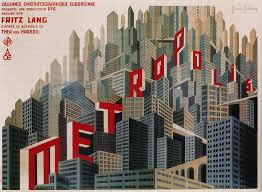Rachel Reviews: Metropolis

February 10, 2017
WARNING: While the author has taken painstaking efforts to leave this review spoiler-free, the definition of a “spoiler” is subjective, and everyone has different thoughts and opinions on this. Please read at your own risk.
Silent movies are not everyone’s cup of tea. They’re popular with film buffs, but the general public doesn’t typically go to a movie to read. Silent films are rarely much in the way of plots or character development, nor do they often leave a cultural impact. There is one exception. Metropolis is iconic and suspenseful, and it tells a good story. Released in 1927, this German film is the original sci-fi flick. It was directed by Fritz Lang and based on the novel by Thea von Harbou, who also wrote the screenplay.
Set in the year 2026, Metropolis illustrates a society divided into two social classes: the rich and the workers, or the “head” and the “hands”. A privileged young man named Freder (Gustav Fröhlich) spots a young activist (Brigitte Helm) from the “depths”, or the underground city in which the workers dwell. He follows her down into the workers’ city and discovers the harsh conditions the lower class lives in. He goes to his father Joh (Alfred Abel), who is a leader of Metropolis. Joh becomes suspicious of Freder’s concern for the workers and goes to an inventor called Rotwang (Rudolph Klein-Rogge), who shows Joh his prototype for a robot. Meanwhile, Freder falls in with the workers and rediscovers the activist, named Maria, who calls for a Mediator between the hands and the head, whom she calls the heart. She wishes for a peaceful solution to her class’s oppression, and figures Freder to be her Mediator. Rotwang kidnaps Maria and creates the robot in her image. The robot then rallies the workers to violently destroy the machines in the workers’ city. The real Maria struggles to escape and warn the workers of her imposter, with Freder’s help.
The thing about silent movies is that they’re overacted to convey emotions in the absence of words. The over-exaggeration of facial expressions and body movements can’t be held against Metropolis, because that’s just how acting was before dialogue. In fact, Brigitte Helm does an excellent job of conveying the difference between good and evil Maria just through her actions. The score is memorable and does well at communicating the mood of the scene, even when it might not be so clear. The plot can be a little confusing at times, especially in the way of characters’ motivation. For 1927, the special effects are amazing, especially when the robot takes Maria’s shape and when Freder falls ill.
Metropolis is one of the most iconic films of all time, whether one realizes it or not. Creators of C-3PO from Star Wars based his design on the robot in this film. At the time of its release, Metropolis was the most expensive film ever made. The music video for Queen’s “Radio Gaga” alludes to this film in its imagery. Other artists, such as Lady Gaga and Whitney Houston, have done the same.
All in all, Metropolis is a good film for its niche, but it’s not one for the general public. It’s suspenseful, interesting, and a great way to learn about film and science-fiction history. As 2026 is now less than a decade away, it’s also interesting to see how we might be living through the eyes of people nearly a century ago.











